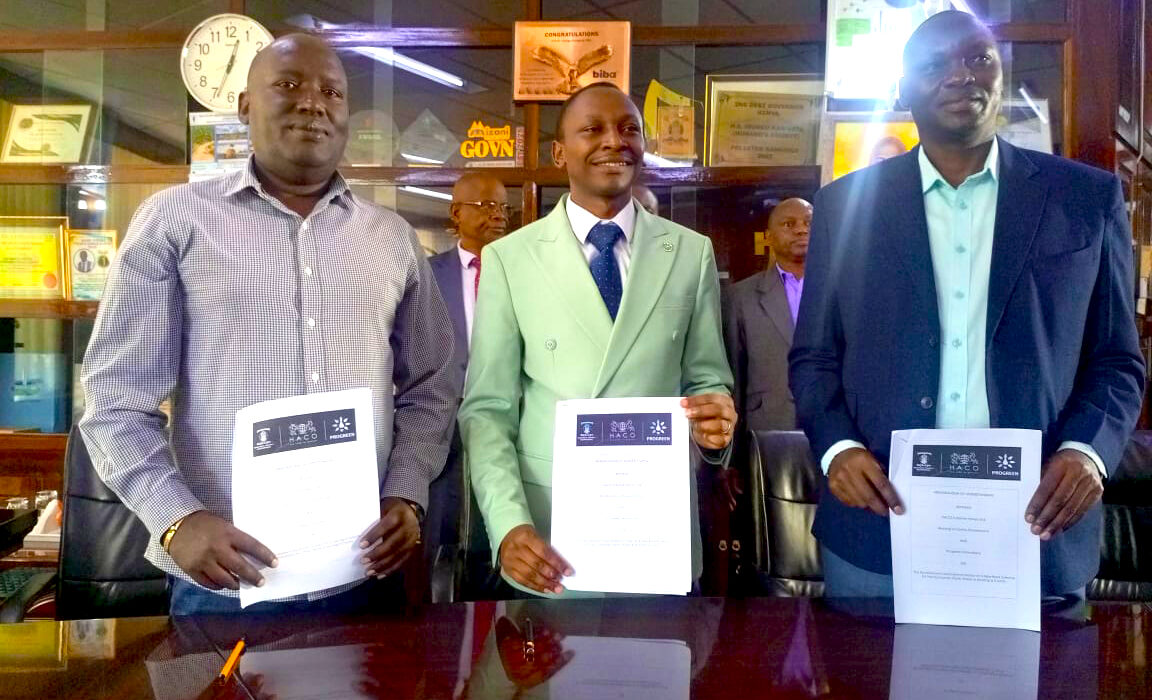A new public-private partnership between HACO Industries, Murang’a County Government and Progreen Innovations has been launched to strengthen plastic waste management and fast-track Kenya’s shift to a circular economy. The agreement, announced at a signing ceremony in Murang’a, brings together manufacturing, county administration and green-technology expertise to create a model for localised recycling and community-driven environmental stewardship.
The partnership marks a significant step for Kenya’s sustainability agenda as counties, manufacturers and innovators respond to rising pressure to reduce the impact of post-consumer plastic waste. The initiative is expected to provide a practical framework for take-back systems, improve community awareness and create new economic opportunities in the waste recycling value chain.
Speaking during the signing, Murang’a Deputy Governor Stephen Munania said the county views the initiative as central to its long-term environmental and economic strategy. He said the project reflects the county’s commitment to promoting cleaner neighbourhoods, building youth employment opportunities in the green sector and reducing pollution in rivers, trading centres and residential estates.
Munania emphasized that waste management challenges cannot be resolved by government alone and require strong collaboration with industry. He said Murang’a County intends to use the partnership to pilot a model that can be replicated in neighbouring counties as part of a wider green growth agenda.
Under the agreement, the partners will co-design and implement a plastic take-back and recycling programme that will introduce branded community collection points for used plastic packaging. The county will allocate designated sites while HACO Industries will support consumer education and recovery initiatives for its product packaging. Progreen Innovations will coordinate recycling logistics, including collection, sorting, transport and processing of the recovered materials.
The initiative is aligned with Kenya’s Extended Producer Responsibility framework, which places accountability on manufacturers and producers to manage the lifecycle of their products. For companies like HACO Industries, this means increased responsibility in ensuring that packaging is not only recyclable but is actually recovered and reintegrated into the production cycle.
Peter Ndichu, HACO Industries Manufacturing Director, said the partnership demonstrates how modern manufacturing must go beyond factory operations to include responsible end-of-life management. He noted that the company aims to transform consumer waste into a resource that can be reinvested in the economy through recycling and reuse.
Ndichu said the project will serve as a real-world demonstration of how producers can “close the loop” by ensuring the plastics they put into the market are accounted for, collected and processed in a sustainable manner. She added that HACO intends for the Murang’a pilot to influence broader industry practices and encourage more manufacturers to adopt circular models.
Progreen Innovations CEO Eng. James Muritu said the collaboration will leverage the company’s technical capacity in ecofuel production, waste sorting systems and recycling infrastructure. He said Progreen’s experience in building community-based waste management systems will help ensure the project delivers measurable environmental benefits, including reduced pollution and improved material recovery rates.
Muritu noted that the company’s participation will include designing the waste collection network, coordinating field operations and monitoring recovery data. He said this structured approach will allow the partners to quantify impact, measure community participation and assess emission reductions resulting from proper waste handling.
As part of the implementation plan, the partners will carry out countywide awareness campaigns aimed at shifting public attitudes and behaviours around plastic disposal. These campaigns will use schools, community groups, local enterprises and digital platforms to promote responsible waste separation at household level.
The educational outreach will focus on explaining the value of recycling, the importance of properly segregating waste and the long-term economic benefits of participating in circular economy systems. The partners argue that building public awareness is essential to making the collection infrastructure effective.
The project will also include periodic data collection to track the volumes of plastic diverted from the environment, the efficiency of the take-back system and the uptake of recycling practices in different wards. Early results will be used to refine the programme and prepare for expansion beyond Murang’a County.
Environmental analysts say the partnership reflects a broader trend in Kenya, where counties and manufacturers are increasingly adopting circular economy approaches to address waste management challenges. The country has been tightening regulatory expectations under frameworks such as EPR, plastic bottle recovery collaborations and anti-pollution county bylaws.
Murang’a County has previously recorded persistent waste accumulation in market centres, populous residential zones and river catchments. The new partnership is expected to address these challenges by establishing predictable collection systems and creating livelihood opportunities in collection, sorting and recycling.
HACO Industries said the initiative reinforces its long-term sustainability strategy, which includes reducing virgin plastic use in its packaging and expanding recycling collaborations with counties and waste management enterprises. The company manufactures a range of personal care and home care products that contribute to significant post-consumer plastic waste volumes.
Progreen Innovations, which has been expanding its recycling footprint across several counties, views the Murang’a partnership as a strategic step in scaling technology-driven waste solutions and strengthening local recycling ecosystems.
The county government added that insights from the pilot will inform policy decisions, guide the allocation of resources to waste management, and support future partnerships with industry players in achieving environmental goals.
The initiative reaffirms the growing role of public-private partnerships in Kenya’s environmental sector as both government and industry seek scalable, sustainable ways to minimise pollution, enhance resource recovery and promote inclusive green growth. With Murang’a positioned as a testbed, the model is expected to influence future collaborations across the country.





